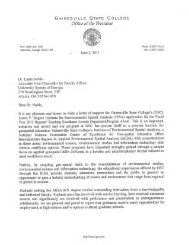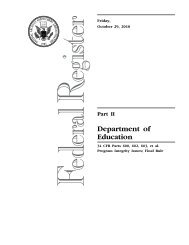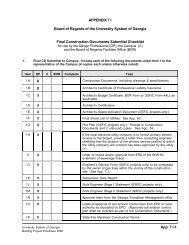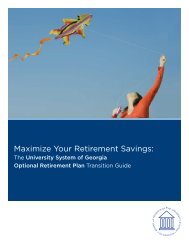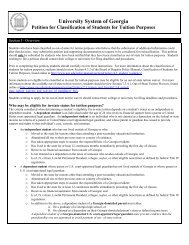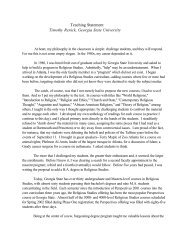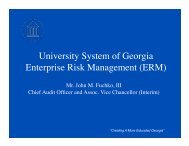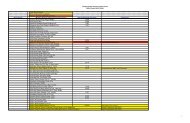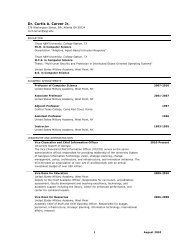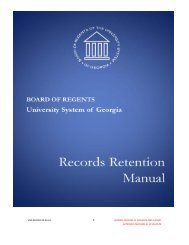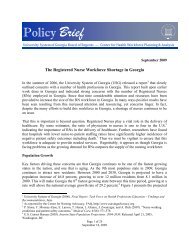REFLECTIVE STATEMENT ABOUT TEACHING AND LEARNING ...
REFLECTIVE STATEMENT ABOUT TEACHING AND LEARNING ...
REFLECTIVE STATEMENT ABOUT TEACHING AND LEARNING ...
Create successful ePaper yourself
Turn your PDF publications into a flip-book with our unique Google optimized e-Paper software.
CONDENSED CURRICULUM VITAEMARY L. GARNEREDUCATIONDoctor of Philosophy, Educational Studies, Emory University, 1998.Master of Science, Applied Mathematics, Georgia Institute of Technology, 1987.Bachelor of Science, Chemistry, University of Florida, 1975.ACADEMIC APPOINTMENTSAssociate Professor of Mathematics and Mathematics Education, KSU (2004-present)Assistant Professor of Mathematics and Mathematics Education, KSU (1998-2004)HONORS <strong>AND</strong> AWARDSHonoree of the 2007 Outstanding Mathematics Education student, University ScholarsCeremony, KSU, 2007Recipient of the 2006 university-wide Distinguished Teaching Award, KSUFinalist for the 2005 university-wide Distinguished Teaching Award, KSUNominated in 2006 for the Distinguished Advising Award of the College of Science andMathematics, KSUNominated in 2003, 2004 and 2005 for the Distinguished Teaching Award of the College ofScience and Mathematics, KSUHonoree of student Joan Lanoie, 2005 WINGS program at KSU.Hooded 9 graduates of the M.Ed. program at KSU, 2003-2005.Recipient of the 2003 Distinguished Teaching Award of the College of Science andMathematics, KSU.Honoree of the 2004 Outstanding Student in the Joint Enrollment Program, University ScholarsCeremony, KSU, 2004Selected to be the first Fellow in Scholarly Discourse Across Disciplines by the Center forExcellence in Teaching and Learning (CETL) at KSU, 2002-2003.Honoree of the 2002 Outstanding Student in the Joint Enrollment Program, University ScholarsCeremony, KSU, 2002Elected President of the Georgia Educational Research Association. Fall 1998 to Fall 2001.Dean’s Teaching Fellow, Graduate School of Arts and Sciences, Emory University,Fellowship, Division of Educational Studies, Emory University, 1993-1997.Elected to Pi Mu Epsilon mathematics honor society, 1985.Elected to Phi Beta Kappa and Phi Kappa Phi honor societies, 1975.COURSES TAUGHTExploration of School Mathematics from An Advanced Perspective I and II (MATH 3495 and4495), Linear Algebra (MATH 3260), Math Studies (MAED 7716), Set Theory (MATH 7700),Honors Seminar: How to Lie with Statistics (HONORS 3000, co-taught with Dr. VirginiaWatson), An Interdisciplinary Course Linking Mathematics, Philosophy, And Literature: TheFictions Of Jorge Luis Borges (HONORS 2290 or SPANISH 4490, Team-taught with Dr. JudyHolzman and Mr. Dewi Wilson), The Myth, Magic, and Mystery of Mathematics: M 4 (KSU 1101which is KSU’s freshman seminar), Discrete Modeling I (MATH 3322), Mathematical Systems(MATH 3390), The Portfolio (EDUC 7797) (This is the capstone experience for the Master of
0 Section is missing. Approaches are incomplete and/or incorrect and/orinconsistent.5 Only a few correct approaches are provided. Little discussion is provided.10 At least three correct approaches are provided (including approachesinvolving technology and algebra); however, there is little discussion(explanation, comparison, reflection) of the approaches and/or someinteresting approaches were omitted.15 At least four correct approaches are provided (including approaches involvingtechnology and algebra) and discussed to some extent, but it is not clear thatthe student understood the problem deeply and can appreciate differentapproaches. The student provides procedural solutions but it is not clear thatthe student understood the procedures conceptually.20-25 At least four correct approaches as well as at least one wrong approach areprovided (including approaches involving technology and algebra) anddiscussed thoroughly. It is clear that the student deeply understands theproblem and the conceptual underpinnings of each approach. The studentdemonstrates an understanding of how solutions and representations areconnected. Any algorithms used are explained conceptually.2. Generalization: Generalize the problem and its solution. Describe the characteristics ofthe solution set.3. Analysis of Generalization using Functions: Using your generalization, analyze therelationships between quantities in the problem.4. Extension: Extend the problem and create a new problem so that a deeper understandingor more mathematics is required to solve the problem5. Concepts. General overview of concepts underlying the problem and then in-depth focuson one particular concept including exploration of the definitions of the concept,properties, representations. Here the student should explore tests and articles fromMathematics Teacher and Mathematics Teaching in the Middle School6. Connections. Discussion of connections with other problems in the curriculum, includingapplications, extensions, etc. In-depth exploration of one particular connection. Again,student should explore middle grades and secondary texts, the Frameworks for theGeorgia Performance Standards, Intermath, and articles from Mathematics Teacher andMathematics Teaching in the Middle School.7. History. One particular aspect of the history of the concept and/or problem isexplored.COMMENTS FROM FACULTY <strong>AND</strong> FORMER STUDENTS:Dr. Victor Kane, Chairman of the Department of Mathematics and Statistics (letter ofnomination for Distinguished Teaching Award at Kennesaw State University) 2006:“Mary is an exceptional teacher of mathematics courses at all levels from General Educationcourses to Graduate courses. She is well known as a challenging instructor who actively engagesstudents and emphasizes understanding of mathematics. This quality holds true in courses suchas Calculus and Discrete Mathematics but most especially in the courses for pre-service teachers... Whether she is teaching math for Early Childhood Education majors or math for Math andMath Education majors or math for Graduate students, Dr. Mary Garner is one of the mostpassionate, hard-working teachers around. She always thinks a lot about what she is doing. Shealways requires her students to think. Sometimes that is their complaint (which only makes therest of us laugh and applaud her more).”
Dr. Nita Paris Graduate Program Coordinator for Department of Secondary and Middle GradesEducation (letter) July 2003:“I am writing at this time because I have become keenly aware of your outstanding contributionsto our program. Specifically, I am working with a large group of graduate students this summerwho are finalizing their portfolios for graduation. Nearly every mathematics candidate hasidentified your class as being the most challenging one that they took at Kennesaw <strong>AND</strong> the onein which they learned the most about mathematics and problem analysis. Your high expectationsand problem-based teaching strategies challenge our candidates to stretch themselves. I wantedyou to know that in the end, they recognize and appreciate the challenges they faced in yourclass. Many of them have said that your class changed the way they look at mathematicalproblems and it has changed the way they will teach mathematics as well.”Some anonymous comments from faculty who participated in the CETL Summer Symposium forthe Integration of the Humanities, Arts, and Sciences:“Helped me to see the flexibility and creativity of math. Opened many (too many really) excitingideas for interdisciplinary teaching.”“I am particularly interested to explore further connections between mathematics and otherfields.”COMMENTS ON STUDENT EVALUATIONSMATH 3495 Spring 2006:“This has been a great experience for me and has truly challenged me to look at mathematicsdifferently.”“This class required a lot of self exploration which has really helped me grow as a math student.With each assignment, I began to question more ideas, and I would then search for those answerson my own.”“Dr. Garner is the single best professor I’ve had at KSU. When I schedule my courses, Igenerally try to do it around her schedule.”“I also would like to add that Dr. Garner’s love of teaching, plus her concern for her students’success has been a marvelous influence on me. It has been a pleasure to attend each and everyclass meeting.”MATH 7700 Summer 2006:“This has been a challenging class for me. Dr. Garner was able to explain some very complexconcepts in terms that I was able to understand. It think the readings and term paper were greatcomplements to the math topics. I like the idea of studying the history of mathematics and how itrelates to class topics. I hope to be able to do this when I teach mathematics.”“I thoroughly enjoyed this class! Dr. Garner was definitely a guide in our education rather than alecturer. We were able to learn the material with a deep understanding in a short amount of time.All of our class time was fully maximized. I would love to have another class with her.”“Wonderful experience. Dr. G really expects you to do your best and does everything to help youget there.”MATH 4495 Fall 2006:“Dr. Garner is still one of the best professors I have ever had. I learn more from her and hercomments on my work and tests than I do in most entire classes.”“I have gained a deeper understanding of the material by letting us to the work rather thaneverything being spoon fed. The history and connections were great! I came away from this class
with the knowledge that I will be able to teach the class with confidence. I wish there were morecourses designed like this one.”MATH 7716 Summer 2004:“I thoroughly enjoyed the class. I had to work harder than I can remember doing, but I learned aton. I think I have a better conceptual understanding of the math concepts we discussed. I think Iwill be a better teacher now.”“Dr. Garner has modeled exactly (sic) what the new performance standards are mandatingmiddle school teachers to do – inquiry based investigations, students communicating,understanding and extending concepts.”“This course has forced me to stretch more than any other class I have ever taken! Dr. Garner isgreat. She is patient and so willing to help when there are questions – and there always are!Thank you Dr. Garner for making me think!”MATH 7718 Summer 2004:“Dr. Garner models NCTM principles. She promotes communication and problem solving. Sherequires multiple representations and connections. Her enthusiasm for the subject is contagious.She brings out the best in her students. She is available, approachable, and helpful.”“Dr. Garner has, without a doubt, the best perspective for instructing 6-12 teachers. Her contentexpectations, wrapped around practical classroom applications, makes for a meaningful class.She rocks!”“Dr. Garner’s joy and excitement towards the material and her students was very apparent.Through her teaching methods she continues to be our example of what an extraordinary teachershould be.”MATH 3495 FALL 2004:“Wow, what a tough class – but, one of the best I have ever taken at KSU. I was reallychallenged to stretch farther than I ever thought I could.”“Although I have never worked as hard in a class in my entire life, I’ve also never learned asmuch as I did here either.”“This was the most beneficial course I have taken at KSU. Dr. Garner’s role as facilitator (notteacher) was instrumental in not only my gaining knowledge, but retaining it and using it. Theproblems that we analyzed were mesmerizing. I found myself unable to stop working on themuntil I truly understood them! This was by far the best experience of my academic career!”MATH 3495 SPRING 2004:“Dr. Mary Garner is bar none (sic) the best professor of Mathematics I’ve ever had – and I’vehad many (with a Masters in Engineering). She is tough, she mentors well, and she makes youwork!! I loved every minute of this class and only wish there was a 3495 part II. If she offered itin the summer, when I’m a teacher, I would come back and audit the class. I can’t think ofanything to improve – just keep Dr. Garner, and this University will keep putting out better Mathteachers!”“This course was one of the most challenging courses I have ever taken. It made me think ofmath in an entirely new way.”“This is an important course in preparation for teaching … I appreciate Dr. Garner’s willingnessto let students have an open discussion. Very few professors would feel comfortable with thisstyle.”“Dr. Garner held the bar high.”
SAMPLE ANALYSIS OF STUDENT EVALUATIONS and PRE&POST-TESTMath 3322 Spring and Fall 2005Components of Course Praise Suggestions forImprovementSpring Fall Spring FallInstructor, Instructor’s Style of teaching 11 9Class discussions 7 7 3*WEBCT 4 6Homework collected 3 2Topics of course (difficulty of proof 2 2…)Group work 2Text 1 6 5Supplementary materials 4 1Tests (and practice tests) 3 6 1Extra credit 1 2Outside availability and help 2 3 1Evaluations: Spring 17, Fall 16After Spring of 2005, one student sent me an email: “I’ve never taken a more difficult class(conceptually speaking), I’ve also never enjoyed one quite so much. The dynamics of that classmade me always eager to attend.”*In this particular class was a student who would sometimes ask inappropriate questions orquestions that were difficult to understand and often disrupted the class. I had trouble controllinghis interjections.Pre-test and Post-test resultsProbleminvolving:Spring 2005(15 students)Fall 2005(20 students)Pre-test correct Post-test correct Pre-test correct Post-test correctCombinations 3 15 1 17Permutations 5 15 1 17Probability(dice) 3 10 2 16Power set 1 10 1Factorials 9 4Function(definition) 4 3Graph Theory 2 1Proof byMathematicalInduction 4 13 0 13Spring 2005: 8 students took pretest but no final exam. 3 took the final and no pretest. 15 total tocompare.Fall 2005: 2 math final and no pretest. 2 pre-test and no final. 20 total to compare.
SELECTIONS FROM A SYLLABUS:HONORS 2290: An Interdisciplinary Course Linking Mathematics, Philosophy, and Literature:THE FICTIONS OF JORGE LUIS BORGESCourse Description:Jorge Luis Borges is the author who has had the most significant influence on LatinAmerican literature in the last forty years. He has also inspired many recent developments inNorth American writing. His dense but extremely rewarding works give off sparks in manydirections, including mathematics and philosophy. In this course we will study the interplay ofliterature, mathematics, and philosophy in Borges' writings and note how his treatment of themaffected the literature of Latin America and today's world in general.We feel that the ideal approach to Borges is interdisciplinary. A team-taught course bringstogether expertise in several areas. We also wish to bring together students from diversedisciplines to discuss Borges' writings in a seminar environment, which will be designed forstudent participation, orally and in writing.No student is expected to enter the class already understanding the literary, mathematical,and philosophical contexts. The course readings will include all three aspects, and the instructorswill provide essential background.Each teacher brings her/his own knowledge and perspective to both the educational and thescholarly work. Dr. Judy Holzman will introduce the cultural context in which Borges wroteand will demonstrate how his writings have contributed to and influenced contemporary LatinAmerican literature. She will show how Borges and his disciples changed the traditionalfictional mode of Latin American literature and developed a new "metafiction."One of Borges' accomplishments was his ability to turn philosophical topics into literature.Mr. Dewi Wilson will focus on this aspect of his writing. He will contribute to the course histhoughts on Borges' use of philosophy (especially metaphysics) and mysticism.Mathematics completes our triple study. Many of Borges' works are metaphors formathematical ideas, and Dr. Mary Garner will lead the study of the mathematical concepts inBorges' work. She is interested in the ability of literature and philosophy to explainmathematical constructs. She will touch on the way Borges enjoys stepping over the fine linebetween mathematics and metaphysics and back again. Dr. Garner will highlight two of Borges'favorite concepts, infinity and the infinitesimal, from the perspectives of mathematics, physics,and metaphysics.Course Requirements:Class participation: Your participation in each seminar is critical. You must complete allreadings and consider all pre-reading and post-reading questions to be ready to participate inclass discussions. At the end of the semester, each of the three instructors will assign your classparticipation 1 to 20 points depending on their subjective judgment of the quality of yourparticipation. These scores will be averaged and added to your total score.Reflections: You’ll be required to complete 10 reflection papers during the semester. Thesepapers will be approximately 4 pages in length (typed, double spaced) and graded according to arubric that you will be able to access on WEBCT. Some of the reflections will be on themes ofyour choosing, others will be responses to questions the instructors pose during the seminar.Your reflections must relate to class discussions and readings.Project: A term project must be completed. We will provide guidelines for the project by the endof September.



